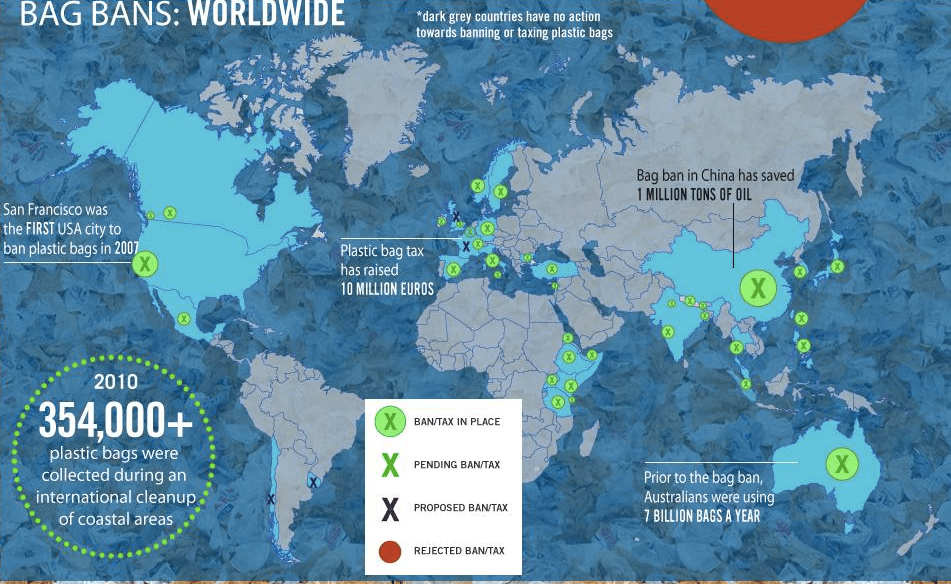 See the entire picture of plastic bag usage in the world.
See the entire picture of plastic bag usage in the world.
I’m glad that I got your attention with the
funny shopping bags from around the world post, but can we be real for a moment? Skimbaco Lifestyle is all about being smart, enjoying life now but being responsible and thinking the future. Read some of the facts about plastic and paper bags – and make using reusable shopping bags part of your lifestyle.
Plastic bags are evil, and paper bags are their cousin from hell, and not using them is a very simple way to care about our environment.
Many think that paper bags are better, but did you know that in the US alone, there are 14 million trees cut down per year simply to supply the demand for paper shopping bags? We all together can make a big difference just by stopping to use plastic or paper bags and start using reusable shopping bags instead. Using reusable shopping bags is smart, green and stylish too! I want you to enjoy life, but why don’t we do it by saving our earth for the generations to come? Living in the moment doesn’t mean that you shouldn’t think of the future nor take actions that are good for future.
Plastic bags are evil. And paper bags are NOT the better option.
Here are some facts about plastic & paper bags.
LANDFILL FACT: A plastic shopping bag can take anywhere from
15 to 1000 years to decompose. What you might not know that paper bags don’t do much better, in fact, it’s even worse. When paper bags are in a compressed landfill, deprived of atmosphere to help them biodegrade, they take almost as long as plastic to decompose, and believe or not but plastic bags are actually more environmentally benign than paper, as they require less space; paper occupies approximately half of overall landfill volume filling our landfills even in a faster pace than plastic bags.
RECYCLING FACT: The cost to recycle plastic bags so outweighs their value that most recycling facilities will not take them, leading more and more to just be thrown out with the rest of the trash – or shipped to China or India where environmental laws are not as strict. More people recycle paper bags than plastic bags, and that’s good news. Sort of. It takes 98% more energy to recycle paper bags than recycle plastic bags, and it requires a usage of harsh chemicals. Sorry, but there is no real win here.
COST OF OIL FACT: Plastic bags are made from petroleum products and natural gas. Plastic bags utilize nonrenewable resources, ultimately
driving up the fuel prices. It takes 12 million barrels of oil to produce the amount of plastic bags the US uses per year.
POLLUTION FACT: Made with chemicals processed at high temperatures,
paper bag production releases many toxins into the atmosphere at much the same rate as plastic production. Paper bags weigh nearly ten times more than plastic bags, requiring more fuel to ship them out to stores. It takes seven trucks to transport the same number of paper bags as can be transported by a single truck full of plastic bags.
WILDLIFE DEATH FACT: They kill animals. Plastic bags and other trash in oceans
kill 1 million sea birds and 100,000 mammals in oceans (like whales, sea turtles and seals) every year.
Need more reasons to start using a reusable shopping bag?
Let’s put it this way; over your lifetime, if you stopped using plastic bags and used only reusable shopping bags, you could save over 22,000 plastic bags – if you start today, you could still probably save 10-15,000! Yes, 22,000 is the average amount of plastic bags one person used in a lifetime. In the US we use approximately 100 billion new plastic bags annually meaning that the
average person goes through between 350 and 500 plastic bags a year. Your actions matter, a lot.
Plastic bags make up over 10% of washed-up debris polluting the US coastline, and public agencies in California alone spend over $300 million on coastal litter clean-up per year. I’m sure we could use that money for something else, like for education, or health care. Live in NYC? This fact makes you think: In New York City, one less grocery bag per person would reduce waste by 5 million pounds and save $250,000 in disposal costs. And that’s one less per person. If the entire city started using reusable shopping bags, the savings would be in millions of dollars.
Stop using plastic and paper bags and start using reusable shopping bags. This simple act will make a big impact in our environment.
Resources:
Reuse This Bag
Environmental Literacy Council
Washington Post
 See the entire picture of plastic bag usage in the world.
I’m glad that I got your attention with the funny shopping bags from around the world post, but can we be real for a moment? Skimbaco Lifestyle is all about being smart, enjoying life now but being responsible and thinking the future. Read some of the facts about plastic and paper bags – and make using reusable shopping bags part of your lifestyle.
Plastic bags are evil, and paper bags are their cousin from hell, and not using them is a very simple way to care about our environment.
Many think that paper bags are better, but did you know that in the US alone, there are 14 million trees cut down per year simply to supply the demand for paper shopping bags? We all together can make a big difference just by stopping to use plastic or paper bags and start using reusable shopping bags instead. Using reusable shopping bags is smart, green and stylish too! I want you to enjoy life, but why don’t we do it by saving our earth for the generations to come? Living in the moment doesn’t mean that you shouldn’t think of the future nor take actions that are good for future.
See the entire picture of plastic bag usage in the world.
I’m glad that I got your attention with the funny shopping bags from around the world post, but can we be real for a moment? Skimbaco Lifestyle is all about being smart, enjoying life now but being responsible and thinking the future. Read some of the facts about plastic and paper bags – and make using reusable shopping bags part of your lifestyle.
Plastic bags are evil, and paper bags are their cousin from hell, and not using them is a very simple way to care about our environment.
Many think that paper bags are better, but did you know that in the US alone, there are 14 million trees cut down per year simply to supply the demand for paper shopping bags? We all together can make a big difference just by stopping to use plastic or paper bags and start using reusable shopping bags instead. Using reusable shopping bags is smart, green and stylish too! I want you to enjoy life, but why don’t we do it by saving our earth for the generations to come? Living in the moment doesn’t mean that you shouldn’t think of the future nor take actions that are good for future.
 See the entire picture of plastic bag usage in the world.
I’m glad that I got your attention with the funny shopping bags from around the world post, but can we be real for a moment? Skimbaco Lifestyle is all about being smart, enjoying life now but being responsible and thinking the future. Read some of the facts about plastic and paper bags – and make using reusable shopping bags part of your lifestyle.
Plastic bags are evil, and paper bags are their cousin from hell, and not using them is a very simple way to care about our environment.
Many think that paper bags are better, but did you know that in the US alone, there are 14 million trees cut down per year simply to supply the demand for paper shopping bags? We all together can make a big difference just by stopping to use plastic or paper bags and start using reusable shopping bags instead. Using reusable shopping bags is smart, green and stylish too! I want you to enjoy life, but why don’t we do it by saving our earth for the generations to come? Living in the moment doesn’t mean that you shouldn’t think of the future nor take actions that are good for future.
See the entire picture of plastic bag usage in the world.
I’m glad that I got your attention with the funny shopping bags from around the world post, but can we be real for a moment? Skimbaco Lifestyle is all about being smart, enjoying life now but being responsible and thinking the future. Read some of the facts about plastic and paper bags – and make using reusable shopping bags part of your lifestyle.
Plastic bags are evil, and paper bags are their cousin from hell, and not using them is a very simple way to care about our environment.
Many think that paper bags are better, but did you know that in the US alone, there are 14 million trees cut down per year simply to supply the demand for paper shopping bags? We all together can make a big difference just by stopping to use plastic or paper bags and start using reusable shopping bags instead. Using reusable shopping bags is smart, green and stylish too! I want you to enjoy life, but why don’t we do it by saving our earth for the generations to come? Living in the moment doesn’t mean that you shouldn’t think of the future nor take actions that are good for future.
